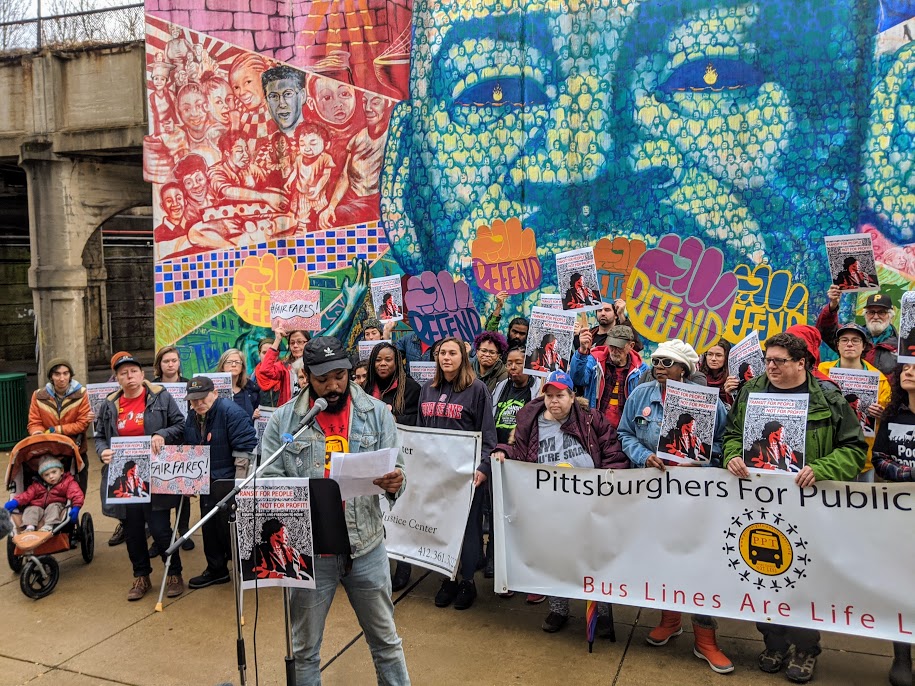
#FairFares: its what our county needs to make transit accessible for all
On February 4th, to celebrate Rosa Parks’ birthday and National Transit Equity Day, PPT members gathered to launch the new #FairFares Coalition & Policy Platform. The platform is the culmination of years of advocacy and efforts by thousands of riders– canvassing, signing petitions, mailing postcards, rallying, testifying for fare equity and decriminalization of fare enforcement.
The #FairFares policy is put forward at a critical moment as the Port Authority begins its public outreach to collect feedback on its fare structure. It is vital for riders to use these public meetings to put forward a progressive vision and values to guide Port Authority in its work.
Read our #FairFares policy below, or see the policy zine we created here.
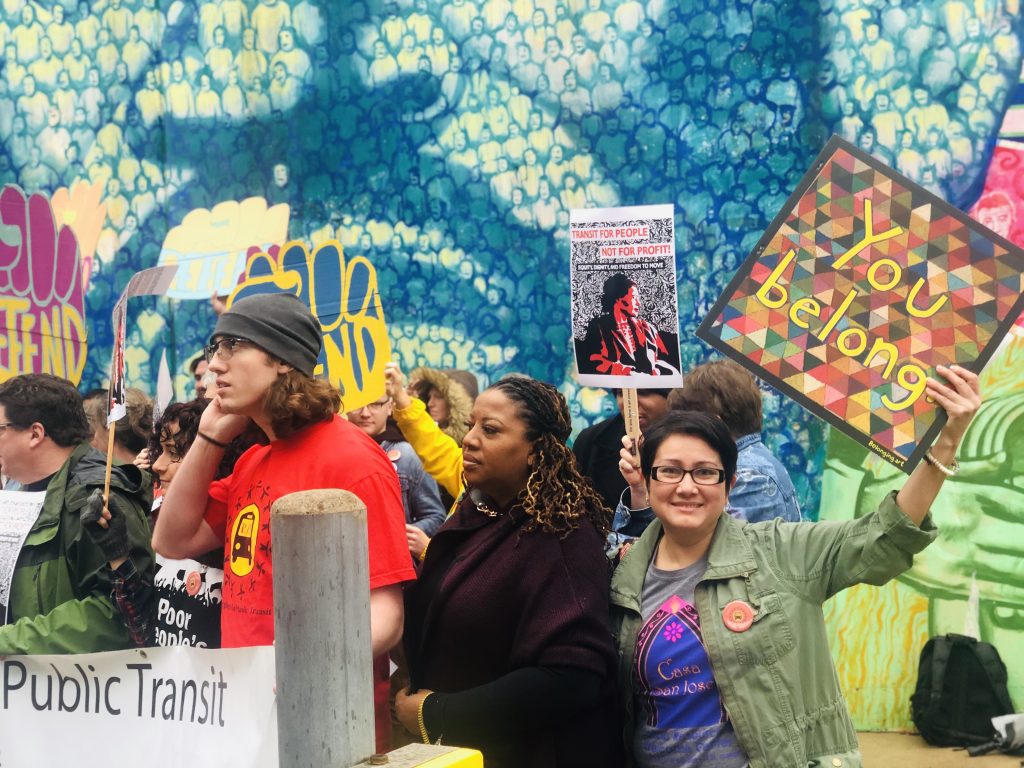

Guiding principles on which the coalition puts forward this campaign:
Public transit is a public utility and a human and civil right. Public transit can not be structured as a fee-for-service model or as a business. Riders create a healthier and more sustainable environment in Allegheny County by choosing public transit over single-occupancy vehicles.
Corporations and large regional non-profits must pay their fair share of the cost of funding public transit because they disproportionately benefit from the service. Fares must not be a primary mechanism for funding public transit.
Fares must not be a barrier to access to public transit, so policies must be enacted to eliminate any barriers due to cost, convoluted cost structures, inaccessible fare payment systems, and hostile or overly punitive fare enforcement policies. Fares must be equitable, effectively communicated, and easily accessible to people regardless of income, age, race, gender, ability, language, geographical location, and immigration status. The current fare structure disproportionately impacts classes that must be protected by civil rights law.
#FairFares Campaign Policy Proposals
Guided by these principles, riders and the #FairFares Coalition worked to research and document dozens of opportunities for improvement to the transit fare system along four central planks: fare cost, fare enforcement, fare payment processes, and fare incentive programs.
Each plank begins by documenting the current conditions for Port Authority riders. Before layout out the #FairFares Coalition’s values for the plank. Finally, each plank goes on to lay out both short-term and long-term goals to improve the fare system for riders and for our communities.

1. Fare Cost (What people pay for fares)
How is the system currently structured?
- $2.50 on Connect Card
- $2.75 with cash
- $1.00 for first transfer under the CONNECT card within 3 hours
- Cash users pay full fare for each transfer
- $1.25 fare for riders with disabilities
- $1.25 fare for children 6-12
- Free for seniors and children under 6.
- Cost is bundled into the tuition for university students at Pitt, Chatham University and CMU. Free for PPS students.
Fare Cost: #FairFares Coalition Values
- No one should be prohibited from taking transit because of the cost.
- Fare structure must center the most vulnerable people, and not privilege the commutes or access to the basic needs of those with the most resources.
Fare Cost: Short-term Goals
- Free transfers
- Fare capping (CONNECT card automatically converts to a daily/weekly/monthly/yearly pass when the cost of the pass is paid in single uses.)
- Ubiquitous access to the CONNECT card, but cash fares should be the same as CONNECT card fares in the interim
Fare Cost: Long-term Goals
- Low-income fare program
- Free transit for people under 18
- Free fares for riders with disabilities
- Free fares system-wide by 2030
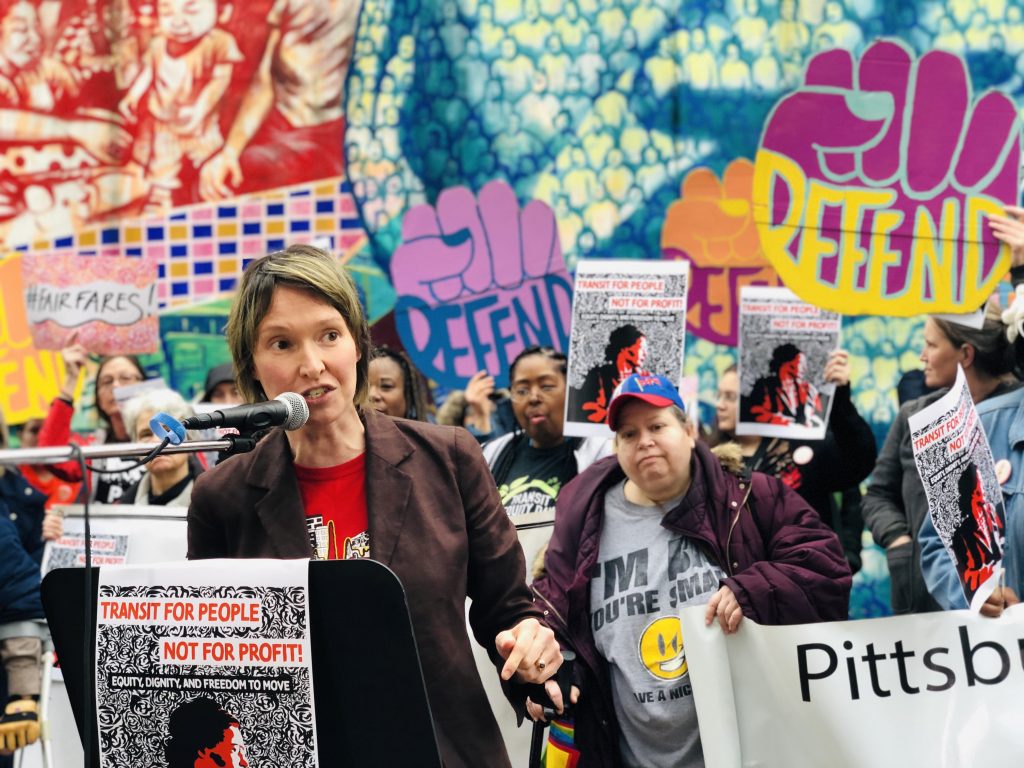

2. Fare Payment Process (How people pay and access fares)
How is the system currently structured?
- Riders can pay via cash, ConnectCard, Senior Pass, Student Pass, and Discount pass
- ConnectCards can be purchased from a Giant Eagle and other authorized vendors, at the Port Authority Transit Center, at CONNECT Card kiosks, or online.
- Port Authority Mobile App is pending.
Fare Payment Process: #FairFares Coalition Values
- Fare payment must be easily accessible and equitable for everyone in all forms regardless of socio-economic status, language, ability, banking status, proximity to CONNECT card kiosks, and access to the internet. Cash payment must always be an option.
Fare Payment Process: Short-term Goals
- Release of an equitable mobile app, including enabling fare capping, access for un-banked users, and information in multiple languages.
- Ubiquitous CONNECT card access
- Passes that start when you tap not by the calendar.
Fare Payment Process: Long-term Goals
- Ability to load fares onto cards while on the bus
- Ability to pay for multiple fares and fare types on 1 card
- Ability to access money loaded onto your CONNECT Card immediately.
- Fare payment process must be compatible with transit agencies across the 10 County region, ACCESS and Healthy Ride
- Policy of fare payment before boarding on the station platform must be implemented on the T, the busways and the future BRT (also known as off-board fare payment).
- CONNECT card kiosks must have several language options.
- There needs to be a reporting mechanism for documenting broken CONNECT card machines.
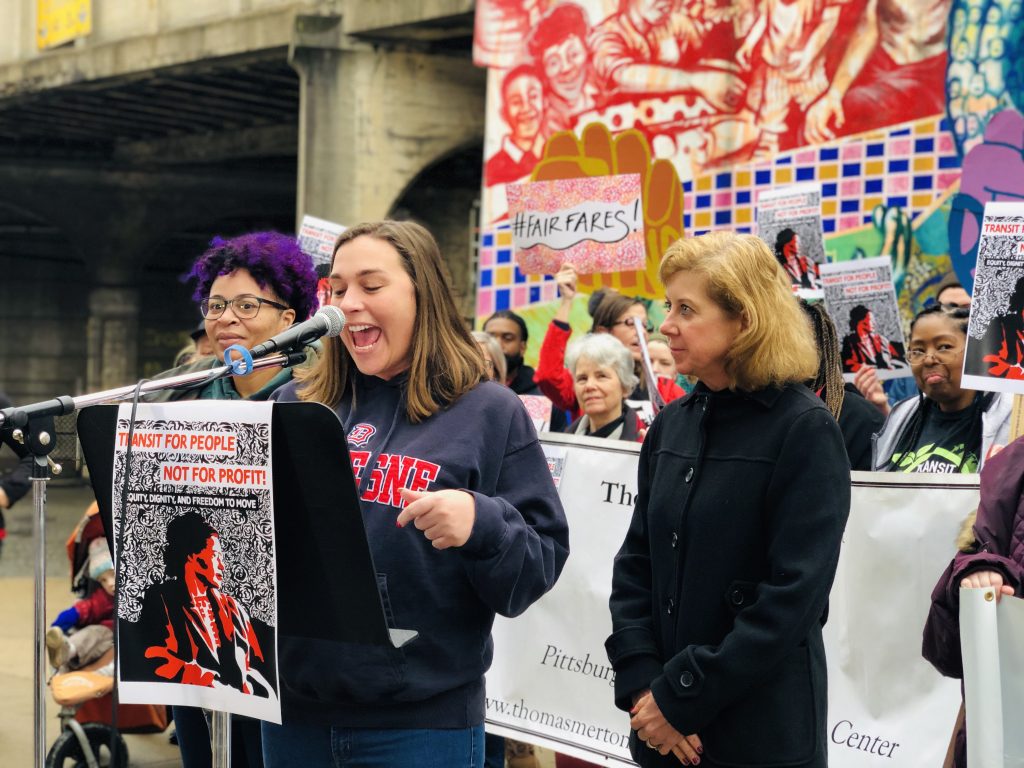

3. Enforcement of Fare Payments
How is the system currently structured?
- The first offense is documented but not prosecuted. The second offense can result in up to a $300 criminal penalty for criminal trespass. The third offense can result in a misdemeanor and up to 30 days in jail. All incidents are run through the police database.
- There is no appeal process within Port Authority.
- Armed Port Authority police enforce fare payment, but any fines paid or criminal proceedings take place in the municipality where the incident occurred.
Enforcement of Fare Payment: #FairFares Coalition Values
- Everyone deserves to be safe on transit
- Non-payment should lead to additional resources, not punishment
- Enforcement must be done equitably
Enforcement of Fare Payment: Short-term Goals
- Civilian, multilingual fare “ambassadors” rather than armed police fare enforcers.
- Make fare evasion a non-criminal offense, like parking violations, with low fines and community service as an option.
- Port Authority should have a policy of non-communication with ICE
Enforcement of Fare Payment: Long-term Goals
- Civilian fare ambassadors, when encountering possible fare evasion, should instead direct riders on how to pay their fare, and help riders who are eligible for low-income fares sign up for the program.
- Riders should have the option to load any fines levied as a result of fare evasion directly onto the rider’s CONNECT Card.
- There needs to be a public, annual audit of fare enforcement impact across gender, race, ability, and economic status.
- Port Authority needs to implement independent civilian oversight commissions for fare ambassadors and Port Authority police.
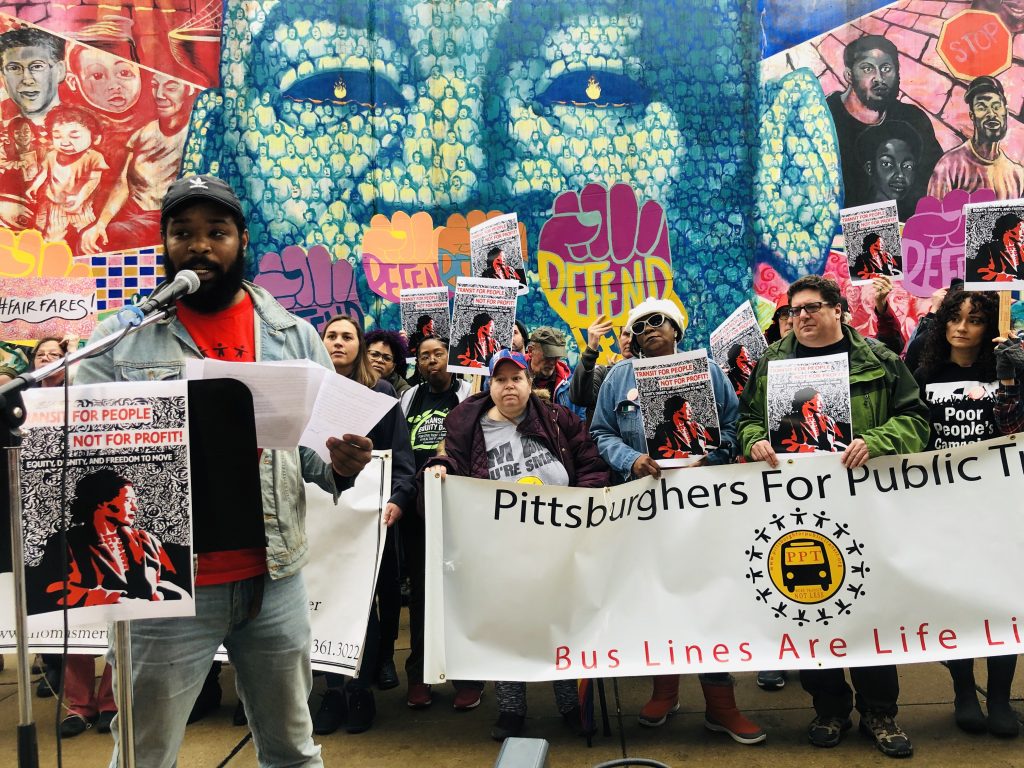

4. Fare Incentive Programs
How is the system currently structured?
- Bus passes are purchased in bulk for CMU and Pitt students. The Universities are charged 50% per use.
- Pre-tax transit passes available through some employers
- Pittsburgh Public School purchases in bulk for high school students
Fare Incentive Programs: #FairFares Coalition Values
- Incentive programs make public transit a more convenient and attractive transportation option than single-occupancy vehicles
- Fare incentive programs should be designed to increase ridership, not profit.
- Programs need to center vulnerable and protected classes, and redistribute the cost of fares onto corporations, developers, and other agencies.
Fare Incentive Programs: Short-term Goals
- Shakespeare Giant Eagle campaign: Calling for parking reductions to pay for bulk bus passes for residents, deepened housing affordability, food justice goals and bike/ped improvements.
- Regular Free Fare Days over the Summer of 2021 funded by the Health Department’s Clean Air Fund.
Fare Incentive Programs: Long-term Goals
- Enable bulk transit pass packages for corporations, events and conferences, cultural orgs, universities, and developers.
- Discount pricing for off-peak hours and weekends to bolster ridership
- Family passes
- Free transit on RADical days funded by the County RAD tax.
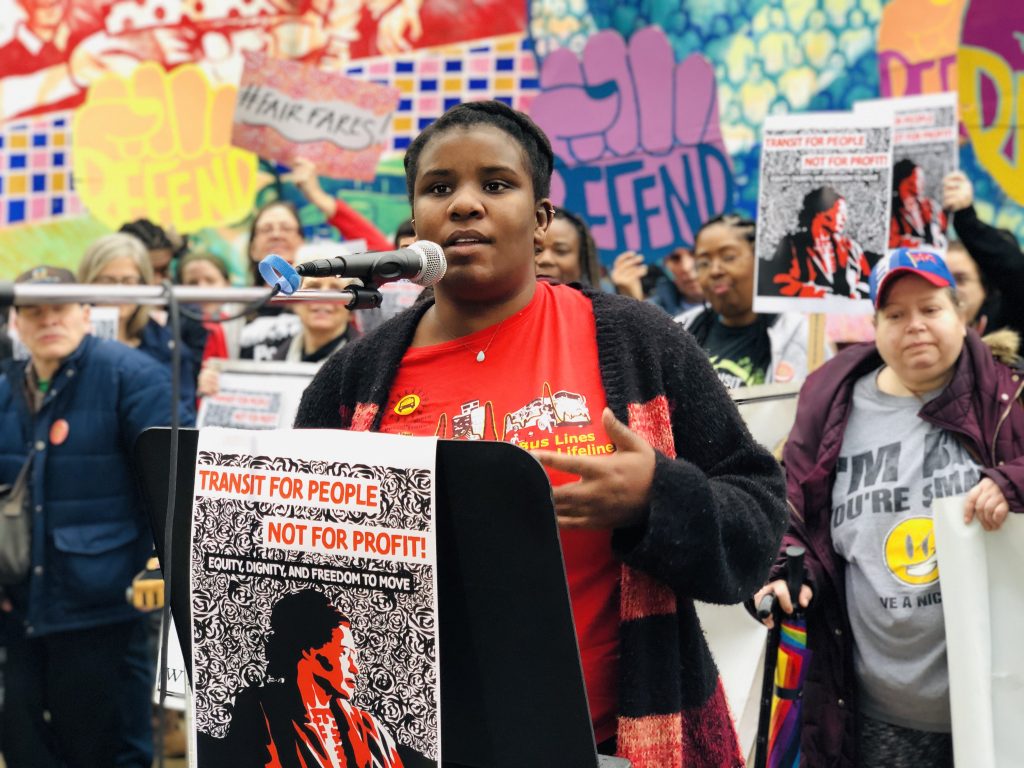
SIGN ON TO SUPPORT THE #FAIRFARES POLICY